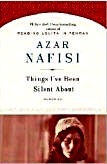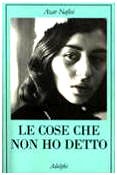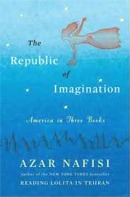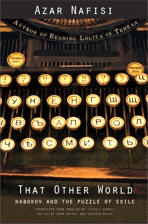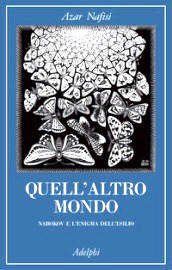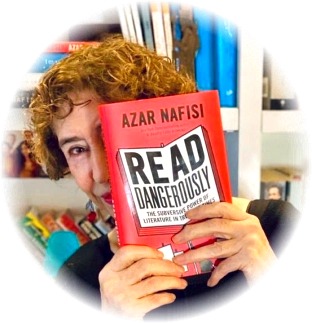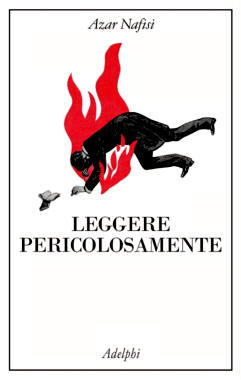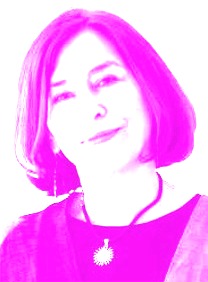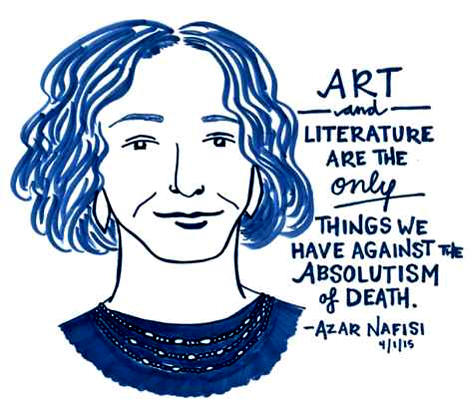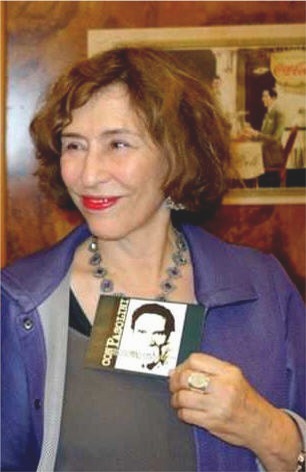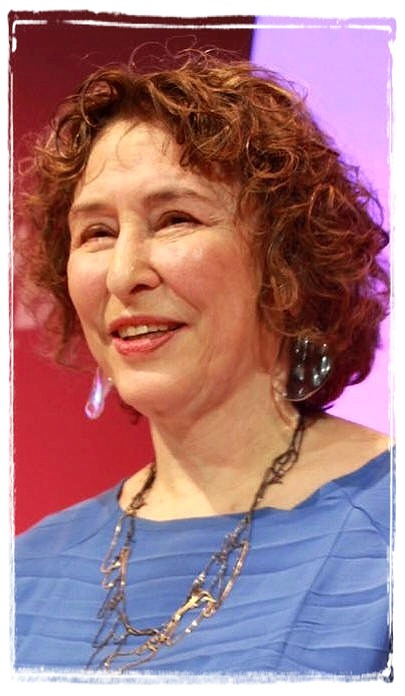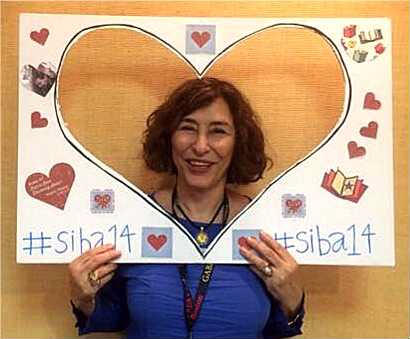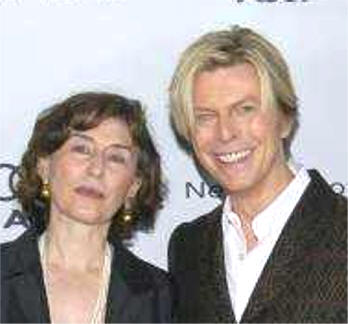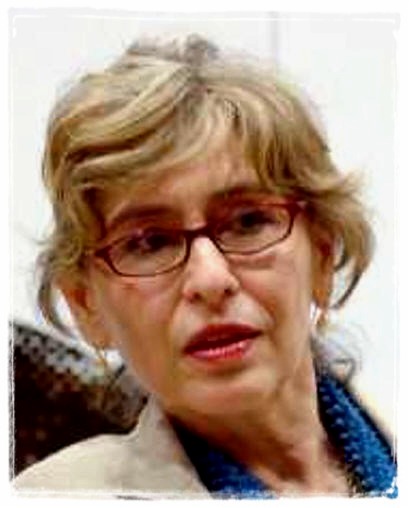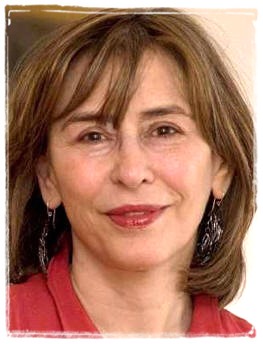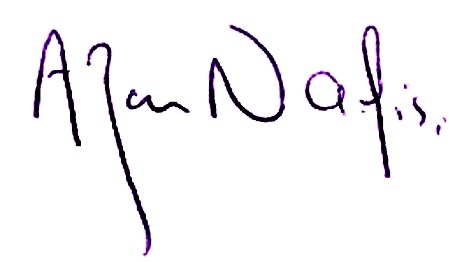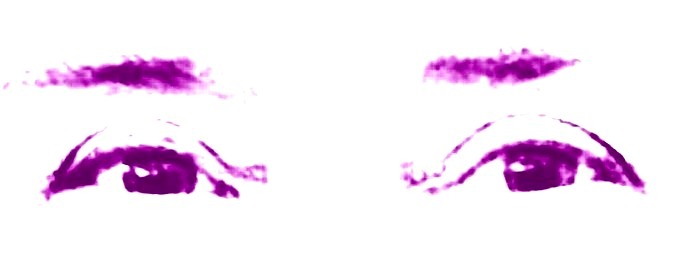|
Azar Nafisi
teheran 1 dicembre 1948 Scrivere per continuare a vivere |
||||||||||
|
Azar Nafisi is a Visiting
Professor and the director of the SAIS Dialogue Project at the
Foreign Policy Institute of Johns Hopkins University - School
of Advanced International Studies in Washington DC - where she
is a professor of aesthetics, culture and literature, and teaches
courses on the relation between culture and politics.
Nafisi è figlia di Ahmad Nafisi, ex sindaco
di Tehran, e Nezhat Nafisi, prima donna ad essere eletta al
parlamento iraniano. Nasce in Iran a teheran il 1° dicembre
1948. All'età di 13 anni viene mandata dai suoi genitori in
Inghilterra per continuare gli studi. Porta a compimento i suoi
studi superiori e universitari negli Stati Uniti, dove si laurea in
letteratura inglese ed americana presso la University of Oklahoma.
Nafisi ritorna in Iran nel 1979 divenendo Professoressa di
Letteratura Inglese presso l'Università Allameh Tabatabai di
Teheran; incarico che terrà per 18 anni, eccetto che per il periodo
1981-1987, nel quale sarà espulsa per non aver rispettato le norme
vigenti sull'abbigliamento. . PREMIO letterario MATILDE SERAO 2018 - TEATRO SAN CARLO NAPOLI
io e donna matilde - due donne emancipate dal mestiere di scrivere .
Matilde Serao è una donna molto moderna, ma anche tanto di più – ha
affermato Azar Nafisi – . E’ incredibile la sua passione per la
conoscenza, la sua sete di verità. E la verità è sempre pericolosa.
Non è un caso che abbia cominciato dal giornalismo che è la ricerca
della verità. Per questo dopo cento anni ci troviamo qui a
raccontarla. La Serao sarà sempre attuale per le nostre figlie, è la
figlia delle nostre figlie.
-AN
.
... Ci chiamano il sesso debole, ma sono gli
uomini ad esserlo . Uno che si eccita solo per il mio corpo, per
i miei capelli o per i tuoi, dovrebbe farsi curare ...
an - taobuk 2023 OSPITE A LIBRI COME_FIERA LIBRO E LETTURA - 2024 - ROMA . Premio Crédit Agricole - 17esima edizione - 'La storia in un romanzo' - luglio 2024 pordenone . AZAR NAFISI E LA GUERRA - ansa.it/intervista/2024-la-guerra-iran-israele-copre-i-problemi-interni-di-entrambi - ROMA 2024
azar nafisi a pordenonlegge premio la storia in un romanzo - settembre 2024 .
|
||||||||||
|
We need concrete & clear policy strategies addressing race, poverty, rights, health & e ducation !
It takes imagination
!!!
Can a Democracy survive without a democratic imagination ?
This is a serious question, not abstract, not
irrelevant . We ignore it at our own peril .
There has never been a more important time
for writers to assemble . This is a crisis of vision,
this is a crisis of faith, and this is a crisis of values.
We need to support the scientists,
the artists, the bookstores, even the publishers for god’s sake
during 'these very dangerous times' ...
Tyrants know the dangers of poets and writers ... cannot tolerate
any censorship in this country ... reading and writing is power.
We just write books because we have to
.
It becomes sort of an obsession ... When I came back to
the United States, the way Iran was portrayed was only through the
eyes of the Iranian regime ... I wanted to write something that
would create a different image - the other Iran.
The one which belonged to the people. Their
culture, their history and to the way they resisted, in fact, the
oppression that was imposed on them by the regime. |
||||||||||
|
«Teheran non può
essere come Tienanmen», i mullah non
possono massacrare la gente per strada: non solo perché «sono
divisi», ma perché non avrebbero i mezzi per tacitare la popolazione
magari soddisfacendola su altri fronti, «ad esempio quello
economico».
the-american-interest.com/totalitarianism |
||||||||||
|
Questa frequenza di risate
nel bel mezzo dell’intervista, e non solo di sorrisi aperti, è
decisamente insolita. Generalmente è tipica di “vecchi saggi”,
capaci di reagire in questo modo schietto e naturale, ad alcune
domande, prima di elaborare la risposta razionale ... |
||||||||||
|
il velo: è un problema che riguarda solo le donne
orientali o c’è anche un’altra forma di velo che riguarda anche
l’occidente?
Parlò di quello che è il velo reale, poi passò a descrivere il velo dell'ignoranza, per esempio. Noi ci creiamo i nostri veli, noi sovrapponiamo la nostra immagine a quella che gli altri hanno di noi, cerchiamo di nascondere agli altri ciò che è privato ed essenziale e in Occidente ci sono dei modi per dire alle donne a che cosa dovrebbero somigliare, come ci si aspetta che debbano agire. rainews24.it
il potere sovversivo dell'immaginazione
I so enjoyed being included in the
Georgetown Institute for Women,
Peace and Security event on recording and preserving women’s oral
histories . |
||||||||||
|
Leggere Lolita a Teheran
La m italialibri.org
Nella repubblica iraniana il sogno di un
musulmano è avere come sposa una ragazza vergine di nove anni, per
cui fra i primi atti ci fu quello di abbassare a nove l’età
matrimoniale. Azar ricorda che negli scritti di Khomeini “il sesso
con gli animali era visto come un modo per tenere sotto controlli
gli appetiti dell’uomo”. Oltre a Susan Sontag, anche Bernard Lewis
ha avuto parole di encomio per il libro. Il New York Times ne ha
parlato come di un “riassunto eloquente sul potere trasformativo
della fiction”. Cynthia Ozick, del New Republic, di una “memoria
angosciata e gloriosa”, l’Indipendent di un libro elegiaco, “un
tributo alla tenacia dello spirito umano”. . Non erano le pallottole a farmi paura, ma qualcosa di molto più remoto. Avevo paura che il futuro, in qualche modo, si stesse allontanando da me . . I have a recurring fantasy that one more article has been added to the Bill of Rights : the right to free access to imagination. I have come to believe that genuine democracy cannot exist without the freedom to imagine and the right to use imaginative works without any restrictions. To have a whole life, one must have the possibility of publicly shaping and expressing private worlds, dreams, thoughts and desires, of constantly having access to a dialogue between the public and private worlds. How else do we know that we have existed, felt, desired, hated, feared ? ... Once evil is individualized, becoming part of everyday life, the way of resisting it also becomes individual. How does the soul survive? is the essential question. And the response is: through love and imagination . ...
A good novel is one that shows the complexity
of individuals, and creates enough space for all of these characters
to have a voice; in this way a novel is called democratic—not that
it advocates democracy but by nature is so. Empathy lies at the
heart of [The Great] Gatsby, like so many other great novels—the
biggest sin is to be blind to others' problems and pains. Not seeing
them means denying their existence. Un grande romanzo acuisce le vostre percezioni.
vi fa sentire la
complessità della vita e degli individui e vi difende dall’ipocrita
certezza nella validità delle vostre opinioni, nella morale a
compartimenti stagni. leggere lolita a teheran
Ho sempre avuto un debole per i sogni impossibili e le cause perse
durant les premières
années que j'ai passées à l'étranger quand J'étais en pension en
angleterre et en suisse puis quand j'aI vécu auX états-unis j'ai
toujours redessiné les endroits où je me trouvais selon l'image que
j'aVAIs de l'iran.
.
She now realizes
that maybe that, too, is a façade, because women in the West are not
as free as she’d always believed.
La letteratura, dunque, come antidoto all’incapacità di codificare la trama delle proprie vite.
Attraverso gli autori o i personaggi cui sono rispettivamente
dedicate le quattro parti in cui è suddivisa l’insolita
autobiografia della Nafisi. Lolita di Nabokov, espressione della
crudele confisca della vita di un individuo da parte di un altro;
James, “fallito coi fiocchi” nella sua ostinazione a scrivere opere
incomprese pur di non rinnegare se stesso; le controverse,
affascinanti eroine della Austen, capaci di sottrarsi all’aridità
del conformismo pur di “raggiungere quell’obiettivo sfuggente che
sta al cuore della democrazia: il diritto di scelta”. E il Grande
Gatsby, imputato d’eccezione in un indimenticabile processo, con
tanto di giudice e avvocati designati tra gli studenti, allestito -
contro l’integralismo borioso e monocorde- dalla grintosa Nafisi in
un’aula di università.
ilsole24ore.com
An
inspired blend of memoir and literary criticism,Reading Lolita in
Tehranis a moving testament to the power of art and its ability to
change and improve people's lives. In 1995, after resigning from her
job as a professor at a university in Tehran due to repressive
policies, Azar Nafisi invited seven of her best female students to
attend a weekly study of great Western literature in her home. Since
the books they read were officially banned by the government, the
women were forced to meet in secret, often sharing photocopied pages
of the illegal novels. For two years they met to talk, share, and "shed
their mandatory veils and robes and burst into color."
solo la fantasia e l’amore possono restituire l’uomo a se stesso
Azar Nafisi
ha insegnato in
vari atenei della capitale iraniana, prima di essere espulsa
dall'Università di Teheran nel 1997 per essersi rifiutata di portare
il velo. Oggi insegna Letteratura inglese alla Johns Hopkins
University. adelphi.it
azar nafisi - Le tensioni sociali, la discriminazione femminile, l'amore assoluto per la letteratura, nella storia che secondo Salman Rushdie ha fatto conoscere l'Iran di oggi meglio di qualunque reportage giornalistico. librisco.it |
||||||||||
|
I libri sono come fiori recisi se non si da loro dell’acqua, non rimangono vivi. La storia di Sheherazade, per esempio, che rapporto può avere con la realtà? Nel suo caso si trattava di permettere al re di guardare il mondo con altri occhi, evocando la curiosità. Poesia e letteratura devono celebrare la vita. Ho lasciato l’Iran portandomi dietro solo libri di poesia e l’inglese mi ha dato la capacità di vedere dentro di me in un’altra lingua. Leggere e scrivere è come stare a casa festivaletteratura.it
You need imagination in order to imagine a future that doesn't exist www.identitytheory.com/azar-nafisi
I do not think that books are about things we see and know they are about things that go beyond appearances
things you
want to know
I would like to think of my own status as what you called 'citizen of the world' or a 'citizen of a portable world' if not of the world
LEGGERE LOLITA A TEHERAN - 2004 bibi e LA VOCE VERDE - 2006 Things I’ve Been Silent About - 2009 THE REPUBLIC OF IMAGINATION - AMERICA IN THREE BOOKS - 2014 THAT OTHER WORLD - NABOKOV AND THE PUZZLE OF EXILE - QUELL'ALTRO MONDO - 2019_2022
alice nel paese delle meraviglie -
alice in wonderland
necesitamos proteger los libros
bibi e LA VOCE VERDE - La prima favola di AZar NafisI la nostra casa, le nostre idee, i nostri sogni possiamo portarli sempre con noi, anche se sono lontani
Bibi è triste, perché
papà e mamma hanno venduto la casa dove è sempre vissuta e dove
abitavano i suoi sogni. Nella casa nuova tutti si occupano del
fratellino appena nato e lei si sente sola. Non saprebbe come fare,
se un bruco trovato per caso non diventasse il suo migliore amico, e
non le insegnasse che la nostra casa, le nostre idee, i nostri sogni
possiamo portarli sempre con noi, anche se sono lontani.
Things I’ve Been Silent
About
- le cose che non ho detto features.csmonitor.com Things I've Been Silent About Memories - https://youtu.be/g-3D71v801I
introduces us to Nafisi's
father, once mayor of Tehran, who enchanted his daughter with
stories and later spent four years in jail by order of the Shah's
regime, and her mother, who was elected to the Iranian Parliament
but embittered by her husband's infid
Asked about the book’s relevance for
contemporary Iranian society and Iranians, Nafisi pointed to the
importance of looking back and understanding the past in order to
explore the present.
Nafisi non n
. The unarticulated, that which is silenced and stifled, becomes as important as what was said, if not more so fb/an - 8.3.2021 lei scrive: fa parte della cultura iraniana non rivelare le faccende private. però poi s’è decisa a scrivere le cose che non ha mai detto. come mai? «Ero letteralmente ossessionata da questa storia, la mia storia. È lei stessa che mi ha cercato, io ho tentato solo di rimanerle fedele fino in fondo. È un cliché, ma è la verità. Dopo la morte dei miei genitori ho sentito l’esigenza, da un lato di saperne di più su di loro, dall’altro di gettare luce su un groviglio di emozioni e sentimenti inespressi che mi portavo dentro, da qualche parte». Ha iniziato Leggere Lolita a Teheran dopo il suo arrivo negli Stati Uniti, nel 1997, e Le cose che non ho detto nel 2003, in seguito alla morte dei suoi genitori. Pensa che per scriverne, sia necessaria una certa distanza da chi abbiamo amato? «Entrambi i romanzi parlano di una perdita, di qualcosa o qualcuno che avevo molto amato. Credo ci voglia distanza dalla materia narrata, anche perché scrivere equivale a una dichiarazione di indipendenza e di autonomia. È un atto che comporta il diventare adulti. Ma la distanza è necessaria anche da noi stessi, perché io sono uno dei personaggi del libro». benedetta marietti - larepubblica.it
la famiglia - il più perfetto sistema totalitario in assoluto
adelphi.it
REPUBLIC OF IMAGINATION - repubblica dell'immaginazione
Nafisi has written the
book her fans have been waiting for: an impassioned, beguiling, and
utterly original tribute to the vital importance of fiction in a
democratic society. What Reading Lolita in Tehran was for Iran, The
Republic of Imagination is for America ... she invites us to join
her as citizens of her “Republic of Imagination,” a country where
the villains are conformity and orthodoxy and the only passport to
entry is a free mind and a willingness to dream.
With close ties to both Iran and the U.S.,
Nafisi found her “true home” in the Republic of Imagination, “a land
with no borders and few restrictions, . . . the only requirements
for entry are an open mind, a restless desire to know and an
indefinable urge to escape the mundane.” As a deeply engaged envoy
from that republic, Nafisi urges us to read widely and inquisitively
because books “enable us to tolerate complexity and nuance and to
empathize with people whose lives and conditions are utterly
different from our own.”
NPR's Rachel Martin speaks with Azar Nafisi
about her new book, The Republic of Imagination, a reflection on
America through three of its most memorable books.
Nafisi calls Americans — left and right — to
account for abandoning a glorious cultural legacy to wallow in
materialism, narcissism and groupthink.
The way I feel is that books are dangerous in
their own way in every society.But the way we treat them here, the
way we destroy realta e immaginario - www.teche.rai.it/2017/05/azar-nafisi
anche l’indifferenza è un
tiranno - sconfiggetela con un romanzo
.pdf AZAR NAFISI A MILANO
Per la Nafisi, che è fuggita
dal regime degli Ayatollah e ora vive in America, in questi tempi
difficili il vero coraggio e la vera forza non sono certo negli atti
di forza dei terroristi ma stanno nelle parole di compassione del
Papa . . LIBRO PRESENTATO A PORDENONE E ROMA DALL'AUTRICE - SETTEMBRE 2015
I'm excited to head to Italy
this week to talk about The Republic of Imagination !
è vero che legge anche molti libri italiani?
piu libri piu liberi 2022
: perdersi e ritrovarsi - roma -
dicembre 2022 .
parla sempre di fiction, però lei scrive non
fiction.
L’esilio più duro è quello in cui non ci si
sente più a casa in casa propria .
ci sono dei passaggi comuni tra le persone che
scrivono, e spesso c'è anche una matrice comune che io ho ritrovato
nel suo libro: la solitudine. Qual è stato il suo rapporto con la
solitudine e tutte quelle cose che sono considerate negative nella
vita, che spesso sono passaggi per arrivare da qualche parte?
E per me la poesia, la
solitudine, sono l’unica cosa che io mi porto in questo mondo, nella
mia stanza. .
I am so intrigued to be
talking at the BookMarks's Festival. It is the exchanges that I look
forward to, and that feeling of this is part of that portable home I
carry with me, part of my Republic of Imagination. iawfoundation.org/community/azarnafisi
America like the rest of the world is in a crisis And I feel that this crisis is not just economic or political It’s a crisis of vision
* fb/an L'IMMAGINAZIONE E' SOVVERSIVA an Le dittature si basano sulle bugie, gli scrittori cercano la verità
Per questo sono pericolosi I believe it is true that all books are mysteries in one sense in the sense that a good story or a good poem or philosophical treatise for that matter but mainly story, depend on the pursuit and resolution of some unknown factor, it is an act of discovery an Literature is always about the other It is taking us to places we have not seen meeting with people and empathising with people we have not known an
do you think literature in any way can help solve
life's big questions, global conflicts, social problems?
. . Azar Nafisi on why we need to cherish rather than ban books
... Throughout my childhood
and teen years, even much later when I had children of my own, my
mother worried that I had my head in the clouds, reading too many
stories, neglecting real life and its problems. My take on having
one’s “head in the clouds” was different from my mother’s, for me it
meant having a place of one’s own, somewhere like Alice’s
Wonderland, or what I later named The
Republic of Imagination. A place on
earth, in our own backyard that might help us get to the clouds and
all sorts of other wonderlands, existing all around us and yet
invisible to the naked eye. I wanted to go there in order to return
to my own home refreshed, armed with a new perspective, prepared to
confront “life and its problems.” For what is a wonderland but a new
and magical version of our everyday reality, rescuing that reality
from the dust of habit and complacency,
what is the Republic of Imagination except
the version of reality as it should or could have been? .
you love fiction so much; would you ever consider
writing a novel? Or have you decided nonfiction is more of what you
want to write? .
Republic of Imagination in france
I had
met foxes before, in fact My father introduced me to the animal in a
fable by La Fontaine. In this story, like most stories, the fox is
sly and clever, cheating a simple crow of his meal. Later while in
Shah’s prison father translated La Fontaine’s fables complete with
its beautiful illustrations which he, an amateur painter, drew
himself, copying from the original. In that and most other
illustrations the fox looked pretty, with a gorgeous bushy tail, and
wide eyes. Little Prince’s fox was not pretty, its bushy tail more
like an upright broom, was not beautiful, and his eyes were so
narrow they could be barely seen, in fact he didn’t really look like
a fox. It seems almost miraculous to me that a fox not like any
other had forever changed my attitude towards that animal—I began to
see it in a different light. From this perspective the fox’s slyness
was not due to malice, but from the need to survive. Although I felt
sorry for the chickens (which didn’t prevent me from eating them)
the fox hunted them so that he could stay alive, unlike some human
beings who not only kill and eat the chickens but hunt foxes for
entertainment and sport. Gradually I came to understand why those
mesmerizing wide eyes, always brimmed with anxiety and fear, seemed
to be on the lookout for some invisible but very real menace.
https://youtu.be/i1U113Q7DY4 - pordenonelegge 2015 - intervista https://youtu.be/BSxMHFO0c_8 - AN at columbia global center paris - 2016 https://youtu.be/SPdicVf2hbg - republic of the imagination - 2020 .
Dear friends, it is with
great joy that I share with you the news that my latest book ‘That
Other World,’ is now published. Those of you who loved Reading
Lolita in Tehran and the Republic of Imagination will hopefully
enjoy this book, too. The truth is, it all started with this book,
written originally in Persian, now published in English. The way I
have written my other books, starting with Reading Lolita, all the
way to the Republic of Imagination, has been shaped by the process
of writing this book first ...
Quell'altro mondo.
Nabokov e l'enigma dell'esilio
Read Dangerously : The Subversive Power of Literature in Troubled Times leggere pericolosamente - 2024 - presentato a pordenonE_premio credit agricole 17ma ed.
e al festival delle idee_esplorando
ignoto - mestre_venezia 2024
Drawing on her experiences as a woman and
voracious reader living in the Islamic Republic of Iran, her life as
an immigrant in the U
www.npr.org/what-it-means-to-read-dangerously
- 2022 alice figini_sololibri.net - 2024 .
|
||||||||||
|
Azar Nafisi
is a professor at Johns Hopkins University. She won a fellowship
from Oxford and taught English literature at the Univ bookbrowse.com/biographies fb/anafisi - facebook.com/videos .
Azar Nafisi
è nata a
Teheran nel 1950. Il padre era sindaco della città e la madre una
delle prime donne ad essere elette nel parlamento iraniano.
. . L’Iran è un paese con una società civile che sopporta con difficoltà un regime che impedisce la circolazione della cultura .
che non può rompere
definitivamente con l’Occidente, che è costretto a misurarsi con la
letteratura occidentale, con la cinematografia e dunque con le
sollecitazioni che derivano da quei prodotti culturali (in termini
di desideri, parole, di immagini,…). Un regine che è costretto a
militarizzare la vita civile e che ancora a ventisette anni dalla
conquista del potere è sulla difensiva. Dunque un sistema
autoritario, chiuso nel suo stesso apparato culturale, diviso o
separato da un’opinione interna che ha maturato un distacco.
I left Iran but Iran did not leave me
Gli iraniani sono gente normale.
Vogliono vivere, crescere, amare: vivono in un paese ricco ma poco o
nulla di questa ricchezza arriva loro. In Iran la corruzione è
fortissima, anche per questo tante persone hanno fame. Quello che mi
auguro è che i leader a quel tavolo sentano sulle loro spalle la
responsabilità della vita delle persone.
interview Whenever I am really nervous and sometimes unhappy
I take out some scoops
of coffee ice cream, mix it with coffee and nuts (either walnuts or
almonds) and immerse myself in the soothing cool of the coffee ice
cream going down my throat. When an idea comes to me for writing,
this nervousness reaches its heights and along with it my
consumption of
ice cream, coffee, and nuts.
Sometimes I steal an
hour or so and go to the Phillips Collection, which is close to my
work, and watch and watch. I like to watch only a few paintings at a
time and focus on them for a while and then move on to others. Every
once in a while I go to the National Gallery in D.C. to pay homage
to the one Da Vinci they have. In order to remember a painting or a
view,
I look at it for a long time, then close my eyes and try to
reconstruct the image in my mind, then open my eyes and look again.
especially with my
family, and three friends with whom we share a great deal. I also
love reading poetry and sometimes Shakespeare aloud when I am alone.
I hold the book in my hands and move around the house, reading and
reading, thinking, If this is not a miracle I don't know what is.
PAROLE DI LIBERTA
* Today bookstores and libraries are custodians of American history and American culture american booksellers association winter institute - 2015
In these times of isolation I am glad I can bring the world into my home through books I have filled not just my office, but my entire bedroom with books
- a welcoming refuge during these
difficult times ...
|
||||||||||
|
As we celebrate our Independence Day |
||||||||||
|
|
||||||||||
|
I libri sono utili se mettono i lettori a
disagio . We read because of our passion for the unknown the unexpected, the other, and, yes, at times, the uncomfortable . Perhaps the best defense of why we need to save books, to cherish them, and to read them comes from the fictional characters themselves, best expressed by a quote from To Kill a Mockingbird : ' Until I feared I would lose it, I never loved to read. One does not love breathing .'
On Book Lovers Day, I shared with Yale Press
why I read . What about you ? Why do
you read ? |
||||||||||
|
la democrazia non deve mai essere data per
scontata |
||||||||||
|
When I was a little girl in Iran
|
||||||||||
|
Some cynics
|
||||||||||
|
I always say that books are like our
children |
||||||||||
|
Afghanistan - talebani Se vuoi sapere quanto è libera e aperta una società, guarda quanto sono libere le sue donne . Le donne, la loro cultura e la loro storia sono il primo obiettivo di forze come i talebani ... I talebani sono arrivati e resteranno nel prossimo futuro ... intervista viviana mazza - corriere.it - 2021 |
||||||||||
|
https://youtu.be/os0MEyCXdws - 2023 - UNA COLLINA DI LIBRI - qdpnews.it/pieve-di-soligo/azar-nafisi-collina-di-libri
OVER THE YEARS .pdf
literature is by nature subversive, always on
the side of the individual and freedom of choice. Its main and most
dangerous weapon is the truth. In its search for truth, literature
going beyond the appearances, reveals what is hidden to the naked
eye, clarifies what has been opaque. And we all know how dangerous
truth can be.
-an
we want to read because we want to discover Happy Happy Independent booksellers day !
Readers of the world unite! Support your independent bookseller !
. |
||||||||||
|
altri autori
|


 ia fantasia ricorrente è che alla Carta
dei Diritti dell’Uomo venga aggiunta la voce: diritto
all’immaginazione. Ormai mi sono convinta che la vera democrazia non
può esistere senza la libertà di immaginazione e il diritto di
usufruire liberamente delle opere di fantasia. Per vivere una vita
vera, completa, bisogna avere la possibilità di dar forma ed
espressione ai propri mondi privati, ai propri sogni, pensieri e
desideri; bisogna che il tuo mondo privato possa sempre comunicare
col mondo di tutti. Altrimenti, come facciamo a sapere che siamo
esistiti?
ia fantasia ricorrente è che alla Carta
dei Diritti dell’Uomo venga aggiunta la voce: diritto
all’immaginazione. Ormai mi sono convinta che la vera democrazia non
può esistere senza la libertà di immaginazione e il diritto di
usufruire liberamente delle opere di fantasia. Per vivere una vita
vera, completa, bisogna avere la possibilità di dar forma ed
espressione ai propri mondi privati, ai propri sogni, pensieri e
desideri; bisogna che il tuo mondo privato possa sempre comunicare
col mondo di tutti. Altrimenti, come facciamo a sapere che siamo
esistiti? 